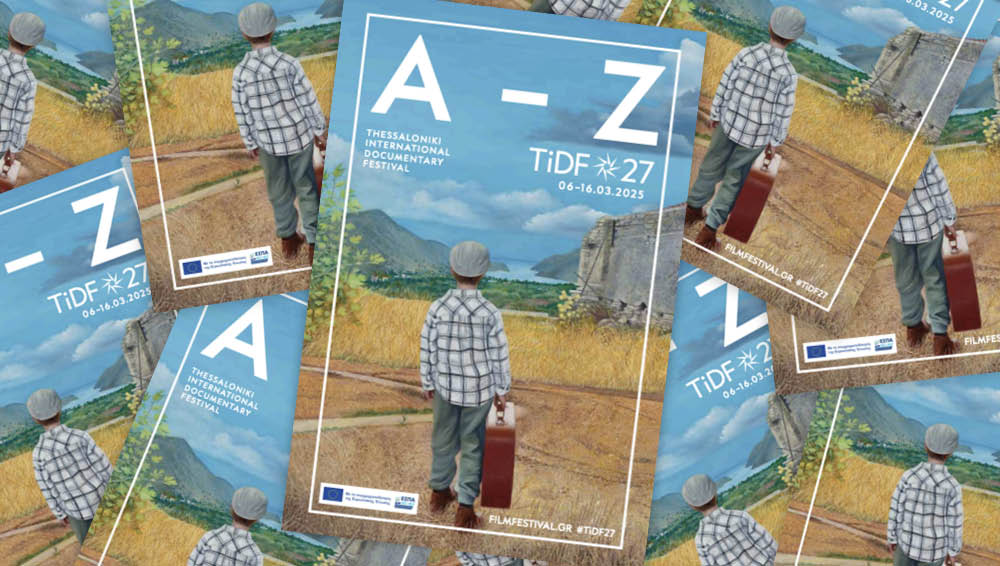18th Thessaloniki Documentary Festival –
Images of the 21st Century
11-20 March 2016
PRESS CONFERENCE
THE LONGEST RUN / WHISPERS OF THE SKY / NOSTOS
Images of the 21st Century
11-20 March 2016
PRESS CONFERENCE
THE LONGEST RUN / WHISPERS OF THE SKY / NOSTOS
As part of the 18th Thessaloniki Documentary Festival, the directors Marianna Economou (The Longest Run), Maro Anastopoulou (Whispers of the Sky) and Sandrine Dumas (Nostos) attended a press conference on Thursday March 17th, 2016.
Maro Anastopoulou spoke first, about her documentary Whispers of the Sky. As she noted, the inspiration for the film came when she traveled to Amorgos in the winter and saw a different face of the island, without visitors, with bad weather and wild landscapes. This feeling urged her to return to record images of everyday life on the island, which is strongly affected by the weather. As the director added, the film started out from the ability of the islanders to interpret the signs of the weather and the nature and predict how the year will evolve. She recorded that, but also all aspects in the life and everyday reality of the islanders, through the narrative style of observation. Asked about the older and younger generations on the island, Ms. Anastopoulou noted: “We started out making the film five years ago, when the crisis was not yet evident or intense. During this time, I saw that the young people prefer to stay on the island, engage with the traditions, maintain the customs and learn, for example, to interpret the signs of the weather, as the older people do”. On how much the islands become a different world in the winter and summertime, the director stressed: “Naturally, there was a great contrast. Although I was initially attracted by that, it was not what I wanted to record. In the process, I saw that the daily life of the islanders in the summer was maintained at a distance from tourism, not deliberately, but because the locals were engaged in their own activities, they have their own life”.
Next, Marianna Economou talked about her documentary The Longest Run, starring two minors-refugees from Syria and Iraq, who came to Greece, were accused of immigrant trafficking and were sent to the Juvenile Correctional Facilities in Volos. “I was involved with this issue completely by chance, two years ago, when the juvenile prisons started to fill with prisoners who had been victimized by traffickers. In recent years, however, the police and the Coast Guard have a better understanding of the situation and are more cautious towards minors, who are no longer brought to prison as simply as that”, said the director. She also added: “The film took a different direction while recording the telephone calls made by prisoners to their families. The conversations between these children and their parents were a shocking experience and this is the whole meaning of the film. Both sides are trapped: minors in prison and their families in countries under conflict. They ask help from each other and also through this communication it becomes apparent why these children leave their countries in the first place”. As to where the children are today, after the documentary, the director noted that one of the two managed to go to Germany after six months and is well – indeed, they still keep in touch - while the other broke off all contact after three months and disappeared - but the director hopes that somehow he too managed to reach Germany.
In her film Nostos, Sandrine Dumas follows the life of the artist Thaleia Flora-Karavia, in relation to her own family story. Referring to what triggered the film, the French director said: “My mother told me stories about her childhood, when she had met the painter, and my curiosity was moved by these stories. Being an actress too, my first thought was that personality of Thaleia would make up for a very interesting role; there was something very wild and free about this woman. After my mother died, I realized that there are many things for which I am not sure regarding my relationship with Greece, because there are many gaps in my family history. So, I wanted to reconnect with the Greek side of my past and suddenly I felt the urgency to make this film”. As the director added: “As a Frenchwoman, I knew that the idea that the French people have of Greece is limited to the beaches, Homer’s “Odyssey” and the refugees. They don’t know anything about the country, so through Thaleia’s story I wanted to create a different approach to the country. If this documentary helps even one person to form a different view on Greece, I will be very happy”. As for the choice of the documentary’s title, Ms. Dumas noted: “In my interviews for the film, a man in Alexandria mentioned “nostos” and so I realized that Thaleia, as well as my mother were Greek women away from their homeland. The title corresponds to my feelings. In the end, I am grateful to the film for changing my plans; it emerged suddenly and it was such a powerful adventure for me”.















